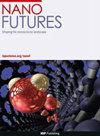Assessment of cytotoxicity profile of gadolinium oxide nanorods and the analogous surface-functionalized nanorods
IF 2.5
4区 材料科学
Q3 MATERIALS SCIENCE, MULTIDISCIPLINARY
引用次数: 3
Abstract
Gadolinium (Gd) has a strong paramagnetic response and is used in advanced magnetic resonance imaging (MRI). Gd is used in the complex form in MRI, but these complexes lack in sensitivity, targeting, rapid elimination from the body, and low internalization into the cell. To replace these Gd complex, the nanostructure (NSs) form of Gd has emerged as a viable solution as the NSs are expected to increase cell uptake and biocompatibility. The cytotoxicity evaluation is the key component that needs to be addressed for translating NSs from the lab to the clinic, and their effect on the cells is a vast area of research. Hence, the present study reports the hydrothermal synthesis of gadolinium oxide nanorods (Gd2O3 NRs) and ex-situ functionalized with aspartic acid (Asp-Gd2O3 NRs). The cytotoxicity studies on two cells namely RAW 264.7 and MCF-7 was assessed in terms of cell viability, morphological changes, and cell cycle analysis. Both types of NRs were well characterized and it was found that Asp-Gd2O3 NRs exhibited enhanced hydrophilicity and dispersity. Cell viability assay revealed enhanced biocompatibility of Asp-Gd2O3 NRs with almost 75% viability even at a higher concentration of 250 µg ml−1. The morphological changes upon internalization of both NRs were done through fluorescent microscopy that revealed no significant change in the morphology of the cell or its nucleus. Further, the cell cycle studies again confirmed the biocompatible nature of these NRs. These results suggest that Asp-Gd2O3 NRs are well suited for therapeutic applications, such as thermal cancer therapy, due to their tunable shape, size, low toxicity, and the possibility of surface modification.氧化钆纳米棒及类似表面功能化纳米棒的细胞毒性评估
钆(Gd)具有很强的顺磁响应,被用于高级磁共振成像(MRI)。Gd在MRI中以复合物形式使用,但这些复合物缺乏敏感性、靶向性、从体内快速消除和低内化进入细胞。为了取代这些Gd复合物,纳米结构(NSs)形式的Gd已经成为一种可行的解决方案,因为NSs有望增加细胞摄取和生物相容性。细胞毒性评估是将NSs从实验室转化为临床需要解决的关键组成部分,它们对细胞的影响是一个广泛的研究领域。因此,本研究报道了水热合成氧化钆纳米棒(Gd2O3纳米棒)并与天冬氨酸进行非原位功能化(Asp-Gd2O3纳米棒)。对raw264.7和MCF-7两个细胞进行细胞毒性研究,包括细胞活力、形态变化和细胞周期分析。两种类型的核磁共振都被很好地表征,发现Asp-Gd2O3核磁共振具有增强的亲水性和分散性。细胞活力测试显示,即使在250µg ml−1的较高浓度下,Asp-Gd2O3 NRs的生物相容性也提高了近75%。通过荧光显微镜观察两种核苷内化后的形态学变化,发现细胞或细胞核的形态学没有明显变化。此外,细胞周期研究再次证实了这些NRs的生物相容性。这些结果表明,Asp-Gd2O3 nmr由于其可调节的形状、大小、低毒性和表面修饰的可能性,非常适合于治疗应用,例如热癌治疗。
本文章由计算机程序翻译,如有差异,请以英文原文为准。
求助全文
约1分钟内获得全文
求助全文
来源期刊

Nano Futures
Chemistry-General Chemistry
CiteScore
4.30
自引率
0.00%
发文量
35
期刊介绍:
Nano Futures mission is to reflect the diverse and multidisciplinary field of nanoscience and nanotechnology that now brings together researchers from across physics, chemistry, biomedicine, materials science, engineering and industry.
 求助内容:
求助内容: 应助结果提醒方式:
应助结果提醒方式:


